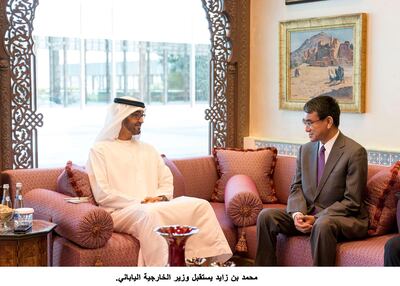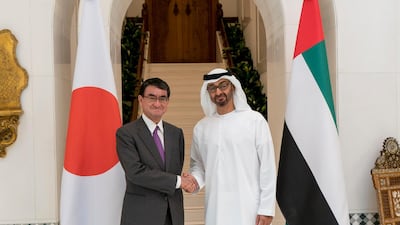From Syria and Iraq to Palestine, Libya and Yemen, Japan is heavily investing in the Middle East's security and stability, according to the country's foreign minister who visited the UAE on Sunday.
Taro Kono met with Sheikh Mohammed bin Zayed, Crown Prince of Abu Dhabi and Deputy Supreme Commander of the Armed Forces, and Foreign Minister Sheikh Abdullah bin Zayed to convey his measures.
"The importance of the Middle East to the entire world is self-evident and it remains the same for Japan," Mr Kono said. "There are things only Japan can do. Japan is unique because we have remained neutral religiously and ethnically and we have not left a negative footprint historically in the Middle East."
Japan has seen peace for more than 70 years since World War II, practicing diplomacy with soft power. The Middle East and Asia have a long history of close engagement, with Islam traveling to South East Asia in the 13th Century, and Japan held the first Japan-Arab Political Dialogue in Cairo in September.
The country is to provide an additional US$12 million (Dh44m) in humanitarian assistance to Syria, bringing the total amount they have given to aid the Syrian people to more than $100m, and the total to the region to $320m.
“The Middle East geopolitically connects Asia and Africa and has become a hub of energy resources, financial dealings and commodity distribution, with several critically important maritime chokepoints,” Mr Kono said.

“Maintaining free and open maritime order between Africa and Asia is crucial for stability and prosperity in the region,” he said, adding that active cooperation on North Korean issues by regional countries was indispensable to increasing pressure on the country.
As the military fight again Daesh in Syria and the group’s influence in Iraq is nearing an end, Japan plans to invite Islamic teachers from the Middle East next year – as it previously has with other Asian countries – to study how the country developed its own economy after WWII and to learn the importance of societal roles.
“There are four Kono Principles,” the minister said. “They include intellectual and human contribution, investment in people, enduring efforts and enhancing political efforts. Japan’s actions to assist stability and security in the Middle East will naturally come along with these four principles.”
“From now on,” he said, “it is necessary to prevent a resurgence by healing the scars left by violent extremism and making sure to promote the building of societies that can tolerate and respect diversity in the region.”
Mr Kano said that Japan would also support arms collection in Iraq, assisting with vocational training, job creation and business start-ups. "Unlike the United States or Europe, nobody has guns in Japan and we know the importance of gun and weapon control," he said. Tokyo is to host an international conference on the topic in the first half of 2018.
Japan also plans to share its expertise, experience and technology in security, disaster-risk reduction, criminal justice as well as nuclear non-proliferation and safety. "We will also facilitate confidence-building and economic development in Palestine," he said.
"Japan supports a two-state solution. The issue should be settled through negotiations and Japan has been promoting the Corridor for Peace and Prosperity initiative in the region."
This will require regional cooperation with parties including Palestine, Israel and Jordan, Mr Kono said.
Analysts said the Middle East’s stability was vital for a number of countries that were heavily dependent on its oil and had investments in the region. Dr Abdulkhaleq Abdulla, chairman of the Arab Council for Social Sciences, said: “It starts from Washington all the way to Tokyo. These are very unsettling times for the region so I understand why the third biggest economy in the world, which is once again booming economically, would want to make sure it has good relations, and the country to start with is the UAE.”
__________
Read more:
France expects increased investments from the UAE
North Korea blames US for tensions in rare UN talks
Dubai approves largest ever government budget for 2018 as it boosts spending on Expo 2020
__________
He said such measures would be helpful in the region's post-Daesh era: "It's going to be a long fight, but one way of attending to it will be to share values and experiences. Japan provides a lot of that."
Others said Japan's interests in oil and gas and the UAE's interest in Japanese cars form the basis of the relationship. Dr Albadr Al Shateri, politics professor at the National Defence College, said: "The UAE is today one of the largest economic partners of Japan in the Middle East."
He said: "Technology, space and culture are fields of potential cooperation between the two countries and with Expo 2020, Japan is in search for a niche in this mega project."
Dr Al Shateri said a partnership with Japan is key for the country's future plans – "The UAE is moving away from oil towards a knowledge-based economy," he said. "Japan stands to play a leading role in the technological transfer."

